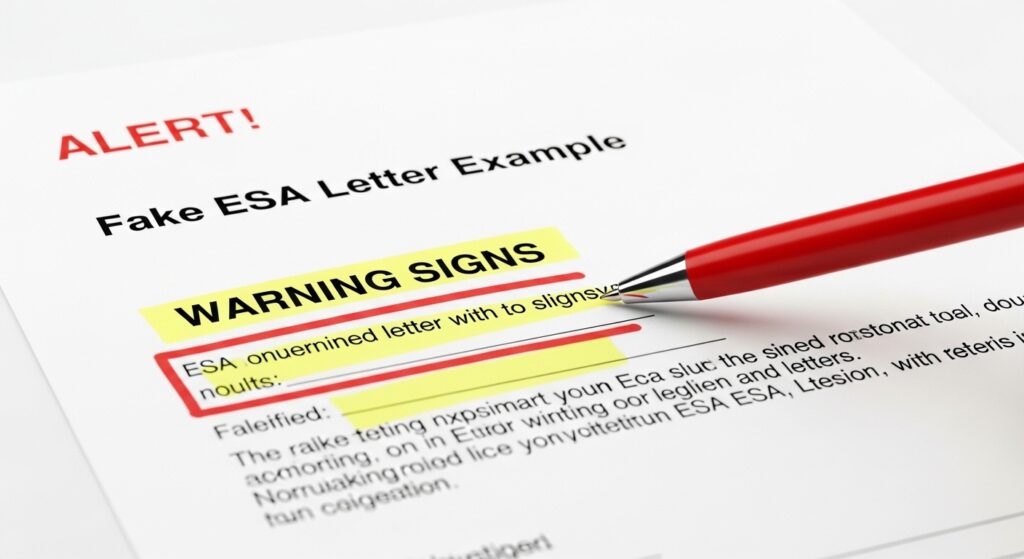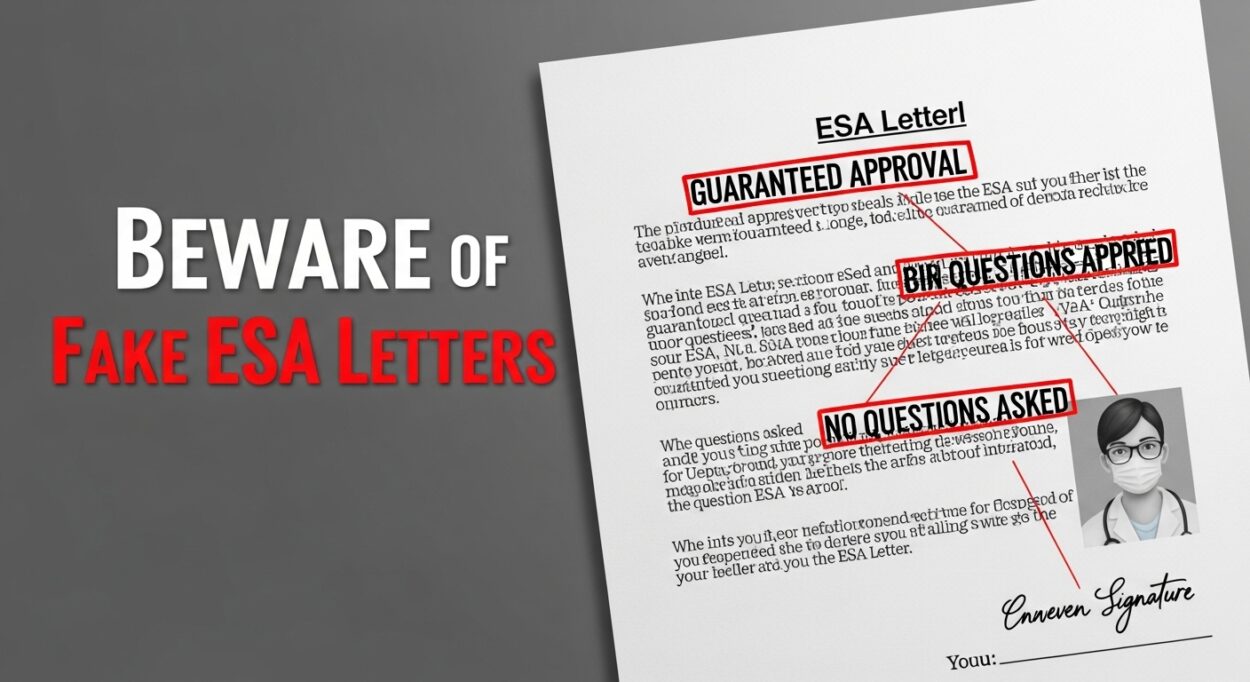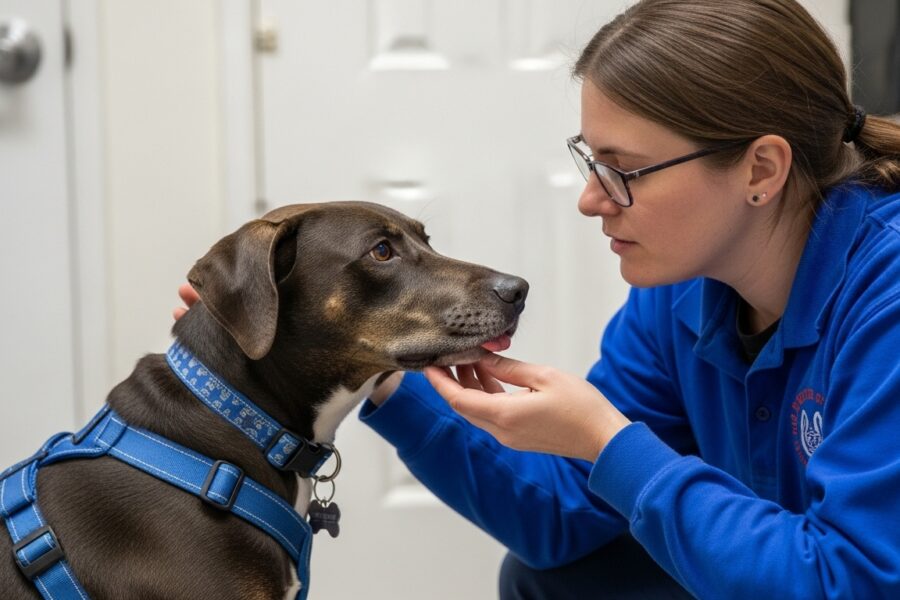Table of Contents
Introduction
The demand for Emotional Support Animal (ESA) letters has grown rapidly—with more people recognizing the life-changing benefits an ESA can provide. But with this growth comes a dark side: the rise of online ESA letter scams. Fake “instant approval” sites, unlicensed professionals, and phony guarantees have flooded the internet, scamming vulnerable pet owners and risking their legal protection.
In this guide, we’ll teach you how to spot an ESA letter scam, highlight red flags, and show you the correct steps to qualifying for a legitimate ESA letter in 2025. Don’t let scammers steal your peace of mind (or your money)—stay informed and stay protected!

What Is an ESA Letter Scam?
An ESA letter scam is any online or offline service that promises—you a legitimate emotional support animal letter but fails to meet legal requirements, provides fake paperwork, or uses deceptive marketing. Victims may pay for a service that doesn’t actually grant them any legal rights, which can lead to eviction issues, denied travel access, or even fines!
Red Flags of an ESA Letter Scam
Here are the most common signs of online fraud when it comes to ESA letters:
1. Instant Approvals with No Mental Health Evaluation
- Legitimate ESA letters require a consultation (live or video) with a licensed mental health professional.
- Scam Alert: If a website says, “Download instantly, no consultation needed!”—run the other way.
2. “Lifetime” ESA Registration or Registry Numbers
- There’s NO official government ESA registry in the US. You don’t need to be “registered” or pay to be listed in a national database.
- Scam Alert: Any site charging for a “registry certificate” is selling a useless product.
3. Vague Company or Provider Information
- A real ESA letter must be written by a licensed mental health professional in your state. The provider’s name, license number, and contact info should be on your letter.
- Scam Alert: If you can’t verify who the provider is, or there’s no way to contact customer support, avoid the site.
4. “Guaranteed Approval” or “Money-Back If Denied”
- No legitimate provider can guarantee approval for everyone—there must be a real mental health assessment.
- Scam Alert: Watch out for wild promises.
5. No Live Assessment or Questionnaire Only
- A few websites replace real assessments with a generic survey or quiz.
- Scam Alert: If you never talk to a therapist or counselor, it’s not a valid ESA letter.
How to Safely Get a Legit ESA Letter (2025)
To protect yourself (and your pet!), follow the correct steps:
1. Research Reputable Providers
- Look for companies that clearly list their professionals, provide licenses, and offer reviews.
- Check for SSL (secure) websites and real customer testimonials.
2. Ensure You’ll Speak to a Licensed Mental Health Professional
- A legitimate letter requires a live or video consultation.
- The professional must be licensed in your RESIDENT state (not overseas).
3. Review Your Letter Carefully
- It should include: the provider’s full name, license number, contact details, and state of practice.
- The letter must state why you need an ESA and connect your mental health to the animal’s benefit.
4. Avoid National Registries & “Official” Sites
- Remember: there is no government database!
- Only the letter matters—avoid paying for cards, badges, registration, or “kit” packages.
5. Ask Questions
- Contact support before purchasing. If they dodge questions or pressure you, that’s a bad sign.

Example of a Real vs. Fake ESA Letter
Real ESA Letter Features
- Written on official letterhead
- Includes therapist’s credentials, license, signature
- Specifies your need based on evaluation
Fake ESA Letter Features
- Generic language or template
- No provider details—or false info
- Arrives instantly or via download, with no interaction
What Happens If You Use a Fake ESA Letter?
- You might face eviction or rejection from airlines/landlords.
- You could be fined or lose your pet’s ESA privileges.
- You risk being flagged for fraud—which can impact future housing or legal matters.
[FAQ: ESA Letter Scams]
1. How can I check if an ESA provider is legitimate?
Check if they use licensed mental health professionals, allow live consultations, and provide verifiable credentials. Search for independent reviews—not just those on their own site.
2. Are there real ESA registries in the US?
No. The US government does not run an ESA registry. ESA letters, not “registrations,” are what count.
3. Can I get an ESA letter with just an online quiz?
No. A real assessment must involve a conversation with a qualified provider.
4. What should my ESA letter include?
Your diagnosis (or symptoms), the provider’s professional details, and evidence linking your mental health need to an ESA.
5. What should I do if I’ve been scammed?
Report the website to consumer protection agencies, your state licensing board, or the Better Business Bureau. Watch for potential identity or financial theft.







